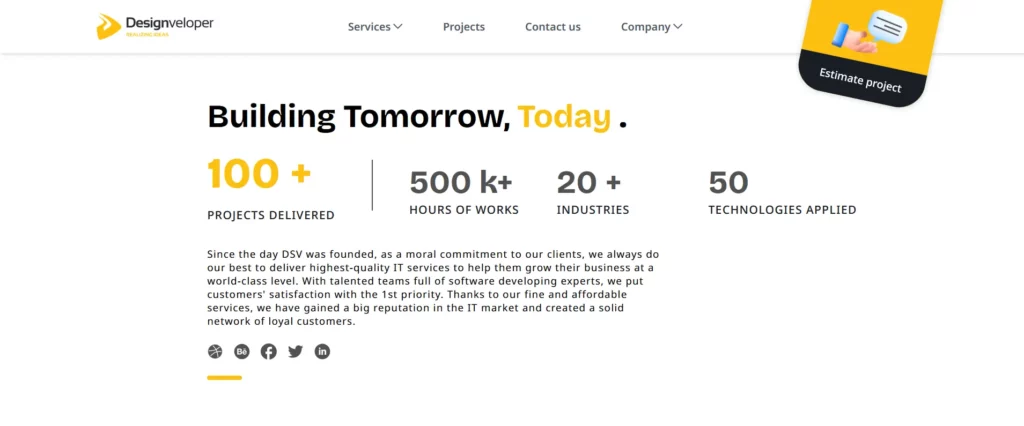7 Tips on How to Choose a Software Development Company

Selecting a proper software development partner can be a make or break project. Many organizations struggle with how to choose a software development company that fits their needs. Because software projects involve high investment and high risk, this decision is important. However, in reality, close to a mere 29 percent of IT projects are completed successfully on time and on budget. Thus, outsourcing development has become common. The key is to choose wisely. Read this article from Designveloper to find out how.
Why You Need a Software Development Company
In today’s fast paced time of the digital landscape, businesses have to innovate in order to keep sites of business. According to a report, the primary concern of 74% of employers is to find tech talent. Partnering with a software development company certainly can, therefore, prove beneficial.
Benefits of a Software Development Company

There are many benefits as you work with a software development company to turn your ideas into reality.
Access to Specialized Expertise
As a result, you gain access to a team consisting of people such as developers, designers, and project managers etc. The collective expertise of the team guarantees that projects enjoy the superiority of the most advanced technologies and practices available. The startups can get their offerings into the market faster, thanks to dedicated teams that speed up product development.
Cost Efficiency
Offshore outsourcing software development can both save your wallet and a lot of times — can help to accelerate workflow. It can also help companies cut down on expenses relating to hiring, training, and the maintenance of an in-house team. Moreover, outsourcing provides businesses the opportunity to draw from an international talent pool at the lowest prices. In the case of nearshore software development, you would pay 46% less than the onshore one.
Focus on Core Business Activities
By delegating software development tasks, companies can focus on what they are good at. External experts are entrusted with technical projects to make businesses focus more time and resources on what drives business growth and profitability.
Scalability and Flexibility
Software development companies allow scaling resources up or down as per project requirements. This adaptability spans particularly well to businesses that experience fluctuating workloads or are starting a new initiative. For example, in a startup, a dedicated team can offer resource flexibility to different stages of project phases, which helps the startups to respond to the changing market demands.
Risk Mitigation
Quality assurance processes can reduce the chance of project failures and technical issues. They have established workflows and testing protocols when it comes to ensuring that software products satisfy certain requirements and remain reliable. This reduces the risks of software development.
Understanding the benefits of engaging a software development company is crucial when considering how to choose a software development company. Such partnerships can grant the necessary expertise, efficiency and flexibility in facing the now complex technological world.
How Designveloper Can Help

At Designveloper, we understand the challenges businesses face when selecting the right software development partner. As a leading software development company in Vietnam since 2013, we’ve successfully delivered over 100 projects across various industries.
Comprehensive Services
We offer a wide range of services tailored to meet diverse business needs:
- Web Development: Crafting responsive, single-page real-time web applications.
- Mobile Application Development: Building cross-platform mobile apps and games.
- UI/UX Design: Designing intuitive and engaging user interfaces.
- VOIP Services: Providing innovative VOIP solutions.
Proven Track Record
Our engagements with clients such as LuminPDF, Swell, and Walrus Education, demonstrate our dedication to sheer excellence. The partnerships emphasize our capacity to deliver high quality solutions, which in turn drive business growth.
Expert Team
Our team consists of experts in VOIP, web development, mobile development, UI UX design. We are using the best of the cutting edge technologies like Java, Python, GoLang, C++, PHP etc. Angular, NodeJS, ReactJS, React Native and iOS and Android application development. With our varied expertise, we turn your concepts into meaningful products.
Client-Centric Approach
Customer satisfaction is always a top concern of Designveloper. We always keep up with new technologies and the tech stack evolves from time to time to meet their clients’ needs. We take a systematic approach of delivering the fastest, best and most reliable quality services.
When considering how to choose a software development company, partnering with Designveloper ensures access to a dedicated team committed to realizing your vision with precision and efficiency.
7 Tips for Choosing a Software Development Company
In this section, we will lay out seven practical tips to help businesses evaluate and select the best software development company for their needs.
1. Clearly Define Your Project Requirements and Goals
Firstly, a company should have crystal clear project requirements before reaching out to any vendor. This involves determining the scope, objectives and constraints of the software. Start by defining the problem that the software needs to solve, who the end users will be, and finally, what features can’t do without. It also means setting a realistic budget range and timeline. Documenting these details in hand will save time when communicating with potential development partners. It eliminates the chances for misunderstandings in the future too: Misunderstandings due to unclear requirements are the most common cause of why software projects fail. Think about completing a short project brief or RFP that includes:
- Project goals and success criteria: What you want to achieve (e.g. improve online sales by X%, automate a certain process, etc.).
- Core features and functionalities: A bullet list of key features the software must have.
- Technical preferences or constraints: Preferred platforms or technologies (e.g. mobile vs. web, specific programming languages or frameworks).
- Timeline and budget: Desired launch date or timeframe and an approximate budget.
So, having these points written down will give you an idea on which factors to evaluate the development companies on to see whether or not they can sufficiently deliver on your vision. In addition, the vendor is given more insight with which to provide an accurate proposal. In the beginning, it is best to be clear about what you’re trying to achieve to ensure that the partnership is successful and keep the risk of changing the scope or superfluous revisions to a minimum.
2. Analyze Company’s Experience and Track Record
Not all experience is equal in software development companies. You need to research the track record of each firm in delivering projects similar to yours. As we do this, we should start with how long the company has been in business and the kind of project they have in their portfolio. If they have created applications or systems on par in their complexity or the industry of what you need? For instance, if you are in the healthcare business, then you may prefer a vendor who has a solution for healthcare software because they will know the required compliance standards like HIPAA. Similarly, a U.S. e-commerce retailer might seek a development team that is capable of developing secure online storefronts or integrating with payment systems, or in a similar task, within the U.S. market.
Be aware of the company’s domain expertise as well as client list. Most development firms will have case studies on their website with details of their work. The advantage is being industry specific. Good vendors should know which are the most common issues and the regulations in your field (finance, healthcare, education) to avoid “costly” learning curves. Also, take into account the size and location of the company. For instance, a vast company may be able to manage great jobs, but a smaller boutique group may supply some extra customization. Where possible ask for examples of past work or even ask to speak to a previous client to find out about their experience. An indication that a development company will be able to deliver quality results for your business is a proven track record of successful projects and happy clients.
3. Assess Technical Expertise and Capabilities

Check to see the technical skills the development company has for your project. Not only are programming languages included, but the entire stack of technologies and tools required to do it are. Assess the team’s proficiency in popular programming languages, frameworks, libraries and platforms they are well versed with. Similarly, before you begin building any type of mobile app project (resp. app for iOS, Android, etc.), make sure to check out if developers are proficient in Swift/Objective-C, iOS SDKs, and frameworks. For instance, if your project is emerging tech, such as artificial intelligence, cloud computing, or blockchain, identify proof that the company works with such high techs. Leading developer districts today work with innovations, for example, AI, blockchain, and AR/VR, and top engineering teams remain cutting edge.
Inquire about the credentials of the company’s development team and its structure. Do they have senior engineers or architects to steer the technical direction of the project? certs/descriptions of expertise from some of these team members have applicable certifications or they have open source contributions as a history, this is a good indicator if such things are available. Additionally, you can ask with which scalability and integration challenges they are familiar with. Also don’t shy away from questions about a high level overview on how they would implement the project – their answers can reveal a lot about their competence as well as their problem solving approach.
4. Prioritize Communication and Cultural Fit
Communication is the most instrumental thing in any successful piece of software project. If you want to evaluate a software development company, assess if they work in a way that corresponds with yours, and if they communicate well. One of the most common reasons for project failure is breakdown in communication and frequent clear communication prevents it. To prevent this, seek out a vendor that is available and open about things from the outset.
In addition, it’s wise to talk about what the collaboration practices should be. Ask what the team will do to keep you in the loop with progress – via regular video calls, demo sessions, or through the project management tool they are using. Agile methodologies are used by a lot of U.S. businesses that hold regular sprint reviews and daily stand-ups. Confirm that the development company is familiar with the project management method that you would like to employ, which can be an agile scrum process, Kanban, or a more standard practice. Additionally, also clarify with whom you will be working and what communication tools you will use (i.e. Slack, Microsoft Teams, Jira for issue tracking) in order to verify that you work well together.
If you are picking out an offshore or nearshore development company, cultural fit and time zone alignment will be critical. Communication and direct contact are appreciated. If the development team is overseas make sure their working hours overlap enough for real time conversation.
5. Check References, Reviews, and Client Testimonials
Don’t believe too much what a development company says – learn by themselves in reference to people the company has worked with and the reviews people give them after the job is done. Good software development companies should readily provide you with references from their previous clients. Reaching out to one or two clients of theirs will help you understand what it’s like to work with that vendor. Make a list of few questions to ask the references, such as, Was the project finished on time and within the budget? How was the company’s communication? Were you happy with the end product and with support? Hence, honest feedback from current or previous clients is very valuable in making sure that the company is indeed credible.
In this way, online reviews and ratings can be used in addition to personal references. Companies such as Clutch.co, GoodFirms, and Google Reviews are some of the platforms where U.S. businesses rate and review software development partners. These reviews sometimes include project type and some history of the client’s experience. Find some patterns in the feedback. It is a good sign if several clients have mentioned that the team delivered high quality work on time. Planet Money suggests missed deadlines and poor communication about deadlines are other red flags. While checking the dates of reviews also helps as the company might have done better in recent years so the most recent feedback also counts.
6. Evaluate Security, Quality Assurance, and Support Practices
Quality and security must be built into software projects. During your selection of the development company, make sure to ask them about their approach to QA and tests. If the firm is reliable, there will be a testing regime paranoid (or as paranoid as they can be) enough to catch bugs and guarantee the software will operate the way it is meant to. You should also ask if they have dedicated QA engineers and what types of testing they perform (unit tests, integration tests, user acceptance testing, etc.) and ideally they will involve you in testing as well, such as providing early builds or prototypes so that you can provide feedback. Testing consistently through development is essential to a successful outcome and avoids nasty surprises at launch.

Also security is equally important in a software, especially when it will deal with confidential data or multitude of users. Discuss what security measures they implement: do they do code reviews or security audits? How do they secure that data while being developed or after deployment? In the U.S., your software may need to comply with the U.S. specific compliance standards such as HIPAA for the healthcare data or PCI-DSS for cc transactions. Make sure the company knows what regulations are related to the project and that they can build compliant solutions.
In addition to development, think of support and maintenance services the company provides. Software is a work in progress after launch: you could need updates or bug fixes or new features. Are there ongoing support plans or warranties with the vendor for their work? Therefore, it’s best to agree how such post-launch issues will be handled and whether maintenance contracts are available.
7. Understand Pricing and Ensure Clear Contract Terms
Cost needs to be compared with value and reliability. So when you compare software development companies, do your best to comprehend their pricing model and what is included within the price.
The most common engagement models that organizations utilize include fixed price contracts, hourly (time and materials), as well as dedicated team arrangements. A fixed price offers advantages in predictability but may be less flexible to change; time and materials offers advantages in flexibility but can be more challenging to control costs. Ask each vendor how the model size and uncertainty of your project harmonizes with theirs. Also, be careful of quotes that are much lower than others — yes, IT outsourcing can help to cut specific development costs by 60–70 %, however, keeping the budget in check is essential, and extremely low — almost unrealistically low — bid may indicate that the team is not a skilled one, and is likely to go over the budget later.
After choosing your vendor, make sure to draw a detailed contract before development has begun. Both parties will be protected by a solid contract, which establishes the ground rules. It should define well what is included in the scope of work, deliverables, timeframe, how payment schedule is and responsibilities of both sides. It should document everything that matters about the project. The contract should be such that it specifies software requirements or design to be delivered, development process and milestones, testing procedures, deployment process, maintenance or support terms and so on, for example. Next clauses, for changing management, intellectual property rights and confidentiality, can as well be accommodated. In fact, many of the contracts for those deals are so robust that they include built in dispute resolution mechanisms and penalties if there’s a serious delay.
Conclusion
Choosing a software development company can be a lengthy selection process, but it is definitely worth it. Following these tips – for defining your needs and how to vet experience, making sure communication and quality are good, and having solid contracts – will increase your odds of having a successful project. The stakes are high, but success is attainable: when a partnership is chosen carefully and well managed, companies often enjoy great success. And in fact, 78 percent of companies that are outsourcing work say that the experience with their external partners has been positive. So this proves that if you apply your due diligence, then you can locate a dedicated development team that will prove to be an invaluable part of your own.
Essentially speaking, in this fast-paced and competitive environment, making an informed decision on how to choose a software development company will help your business innovate effectively while avoiding common pitfalls. All in all, by ranking any of the above firstly the vendor selection process can be viewed with confidence by any organisation and their software development journey can start with good foundations.

















































